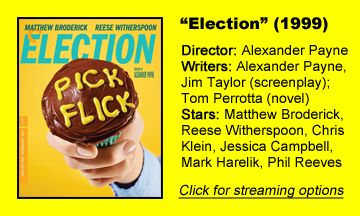Writer-director Alexander Payne’s breakthrough film, “Election,” was somewhat buried among the glut of teen classics in 1999. That’s appropriate, because it’s more timeless and less nostalgic than its brethren from that year; today, it remains a near-perfect portrayal of elections, popularity and the fact that God does not favor the best human beings.
I almost typed “satire” instead of “portrayal,” but “Election” is too on-point to be called a satire. (It is a comedy, though, in that way of extended takes and funny images – like a tiny car peeling through town – that are Payne’s staple.)
Stylized stereotypes
The performances of the rival student-body president candidates at this Omaha school are stylized, in a good way. Reese Witherspoon’s Tracy Flick is so put together that it seems every word out of her mouth is carefully honed from years of practice. And a never-better Chris Klein plays Paul Metzler, the wide-eyed and lovably dumb Midwestern guy who couldn’t think outside the moment if he tried.
They comprise half of the standout main cast. It’s fun to watch Matthew Broderick as teacher Jim McAllister shortly after watching “Ferris Bueller’s Day Off.”
I can imagine Ferris grew up and a switch flipped in the sky that turned all his lucky breaks into bad breaks. Tracy, Paul and Jim provide voiceover narration illustrating their decidedly different outlooks and giving the film engaging momentum.
Jessica Campbell’s Tammy Metzler, Paul’s younger (adopted, as we learn in an amusing throwaway line) sister, rounds out the quartet. Tammy doesn’t get as much attention, but she does get the best campaign speech, wherein she tells the student assembly the only thing she will do if elected is dismantle the student government.
Amid the raucous cheers, she adds: “Or don’t vote for me! Who cares? Don’t vote at all!” The cheers reach a fever pitch. (I also adored Campbell in “Freaks and Geeks” and think it’s a shame she didn’t have a bigger career.)
Broad, funny portrayal
Don’t be hesitant to watch “Election” out of fears it chronicles poisoned partisan politics; there’s none of that. It’s a broader, funnier portrayal of the modern election process. Unlike most fictional high school elections, no one promises more vending machines. Tammy’s off-the-cuff speech offers the only promises.
We never learn what Paul or Tracey stand for – Paul because he doesn’t know he’s supposed to have a viewpoint, Tracy because she knows elections aren’t about viewpoints.
It’s no accident that no platforms are revealed in the screenplay co-written by Payne’s regular writing partner Jim Taylor and based on Tom Perrotta’s novel. The film shows that elections are popularity contests, and that popularity is achieved through advertising.
As frontrunner Tracy tells Mr. McAllister: “Coca-Cola is by far the world’s number one soft drink and they spend more money than anybody on advertising. I guess that’s how come they stay number one.”
When Tracy appears to lose the election, her mom suggests maybe one more poster would’ve pushed her over the top. It’s darkly funny, but it’s no joke; although advertising can’t be boiled down to hard-and-fast statistics, it’s not wrong to think one more poster might’ve meant one vote going the other way.
‘Did Not Vote’ wins again
Meanwhile – as revealed in an offhand line of dialog – Tammy would’ve won the election in a landslide if she hadn’t been disqualified: A plurality of students voted for her even with her name crossed out. This might be Payne’s and Taylor’s parallel to how “Did Not Vote” wins every presidential election but it’s rarely talked about.
Although election ads often use the narrative of “heroes” and “villains,” “Election” resists portraying anyone so clearly – except perhaps Mr. Novotny (Mark Harelik), who has a relationship with Tracy and is dismissed early in the narrative. Tracy is the antagonist, but she’s hard to hate (which makes her more detestable).
She works harder than anyone and, if you believe “the early bird gets the worm,” she deserves to win. Yet Tracy wants to win purely for her own sake, and she gets away with tearing down all the campaign posters (in a magnificent fit of uncorked rage, later paralleled by Mr. McAllister at a motel vending machine) only because Tammy falsely confesses (for her own brilliantly convoluted but selfish reasons).
When we last see Tracy, she’s flawlessly dressed and groomed, working for a Nebraska representative in D.C. We know she’s going to climb the ladder and make a great life for herself, but not make anyone else’s life better with her career as a big government leech.
Poor Mr. McAllister
Mr. McAllister, in his voiceover, says he’s happy with his cramped $1,500-a-month apartment in New York and his museum tour-guide job and new girlfriend. I don’t quite believe him. Maybe it’s the soda he hurls at the limo carrying Tracy, but I feel like he’s miffed by the way the world works.
In sh*****g on its most likable character, I can’t say “Election” gives us a happy ending, but the movie’s vibe masterfully parallels election season. You vote for your favorite candidate (or don’t vote; there’s nothing wrong with that, as Tammy says), the results come in, and the person with the most brand recognition takes office.
It appropriately caps a cycle of bad behavior and flat comedy. In real life it’s gross; in Payne’s film (although it might not have the safe distance of an extreme satire) it’s at just enough of a remove to be smart and funny.



